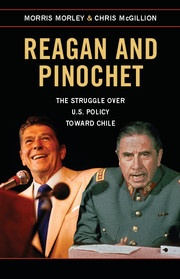2 - Turning the Tide
Published online by Cambridge University Press: 05 February 2015
Summary
Following the collapse of negotiations involving Interior Minister Sergio Jarpa and the AD, State Department Counselor Edward Derwinski arrived in Santiago in early November 1983 carrying a singular message for the Chilean government: with the recent transition from military rule to democracy in Argentina the previous month, Chile risked being the “odd man out” in the region vis-à-vis relations with Washington. Derwinski’s instructions from Motley were to “exert gentle but firm pressure” on the regime to negotiate an agreement with the moderate opposition on a transition timetable. In meetings with the opposition, Derwinski encountered an AD leadership that was “uniformly pessimistic” about the future of any dialogue, convinced that Jarpa’s “good intentions” would inevitably fall victim to Pinochet’s refusal to accept any erosion of his “dictatorial powers” and that this, in turn, would almost certainly “radicalize the political process” in ways that could only benefit “the far left.” The severity of the socioeconomic crisis reinforced the appeal of the more radical sectors of the opposition movement. Until further notice, Derwinski was told, the AD saw no alternative to returning to civilian disobedience and mass mobilization politics to put maximum pressure on the regime to make concessions, otherwise nothing would change. Nevertheless, at a press conference before his departure, Derwinski saw no contradiction in reaffirming the existing U.S. policy approach: “silent diplomacy is something we prefer.” A State Department policy review did not suggest otherwise. The “uncertainty” surrounding the domestic political landscape, it concluded, dictated that in the short term, U.S. interests “would be best served by maintaining a cooperative bilateral relationship with Chile” (meaning the junta) and working behind the scenes to get the regime and the nonradical opposition to agree on a transition timetable.
- Type
- Chapter
- Information
- Reagan and PinochetThe Struggle over US Policy toward Chile, pp. 68 - 104Publisher: Cambridge University PressPrint publication year: 2015

